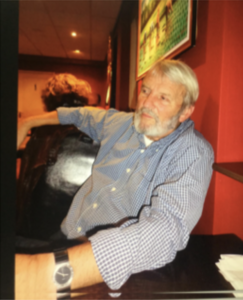In 2014, the Department of Justice and Equality published a Strategic Review of Penal Policy. While finding some merit in that report by the Strategic Review Group, this critique identifies a number of very serious shortcomings in it. The article was written shortly after the publication of the Strategic Review, but the author would contend that all the problems in the prison system identified here remain to be properly tackled nearly ten years later, and many of these problems – such as the size of the prison population, prison conditions and the neglect of young adult men – have worsened greatly. Notably, while the All-Party Oireachtas Committee on Penal Reform, which reported in 2013, proposed a reduction of one third in the prison population over a period of ten years – which would have brought the population to 2,850 by 2023 – today (29/02/2024), the number in prison stands at 4,883 – over 2,000 more people in prison than the All Party Justice Committee envisaged!
Plenary talk to the European Prison Education Association (EPEA) Conference, Tønsberg, June 2023
The following presentation was delivered remotely to the 2023 EPEA Conference in Tønsberg, Norway. It marked the publication of the book on the history of the first two decades of the EPEA, The Emergence of the EPEA by Langelid et al. The book mainly covers the years 1989 to 2010 and dwells especially on the values and thinking, about prisons as well as education, that lay behind early developments. As well as giving a sense of what is described in the book, the presentation also outlines the unease felt by the four authors about the direction taken by the EPEA more recently, as well as the limited support for genuine education found in many prison systems today. The full text of The Emergence of the EPEA is available as the next item on this website.
Robert Suvaal: An Appreciation
‘Robert Suvaal: An Appreciation’ by Sonia Kurten-

Vartio (Finland) and Kevin Warner (Ireland) first appeared in the Irish Prison Education Association’s (IPEA) Winter Update in January 2021.
Resisting the New Punitiveness
‘Resisting the New Punitiveness’ is a chapter from Global Perspectives on People, Process, and Practice in Criminal Justice, a book published in 2021 in the USA by IGI Global (Advances in Criminology Series) and edited by Liam Leonard.
This chapter builds on PhD research into the penal policies of Nordic countries and in particular Denmark, Finland, and Norway. Essentially, the investigation asked whether the increase in punitiveness in relation to prison systems that is presumed to occur under the ‘culture of control’ of late modernity can be found in these countries. The scale of imprisonment, the ‘depth’ of imprisonment, and the perception of the person imprisoned were all examined. The prison systems were investigated through analysis of documentation and recorded interviews with key personnel, supplemented by visits to a representative range of prisons. While there have at times been some signs of ‘new punitiveness’, especially in Denmark and Norway, in general it can be said that none of the Nordic countries have followed the path predicted by David Garland. Ireland, however, made its penal system more punitive in recent decades, prioritising ‘control’ over ‘care’ and providing support now ‘for the few rather than the many’.
The Emergence of the European Prison Education Association, EPEA, by Torfinn Langelid, Kaj Raundrup, Svenolov Svensson and Kevin Warner
(Halden Prison Publishing House, 2021)
Although conceived in 1989, the EPEA was really an organisation which emerged over several years. This new book charts that development and indeed earlier efforts, from the 1970s in particular, to promote international co-operation around education in prison. The aims of the EPEA have long been to promote opportunities for learning for everyone in prison and to support prison educators through European co-operation.
The book teases out the thinking and values around both penal policy and adult education that helped shape the EPEA, an outlook associated especially with the Council of Europe. It is striking how the human rights based and humane philosophy of the Council of Europe was strongly held by many Director Generals and others in leadership in prison systems in Europe in the 1980s and 1990s, and how crucial these prison leaders were to the formation of the EPEA. The authors show how they as much as educators advocated education as a human right for all, and an opportunity for personal development rather than an instrument for so-called ‘rehabilitation’.
Europe has changed greatly since the inception of the EPEA in 1989 and the EPEA has been carried on the tide of that change. The main EPEA conferences every two years have been noted for their atmospheres of learning, mutual support and encouragement, especially for those ‘working on the ground’ in many kinds of penal institutions. These major events brought people together from across a continent where many barriers had been removed – east and west, north and south – with many also from other parts of the world. As the story of Europe continues to evolve, the need for the EPEA and its capacity to bring people together from all corners, while adhering to the best of European values, is as strong as ever.
Should We Judge Education by Recidivism Rates?
‘Should We Judge Education by Recidivism Rates’ is an edited version of a short panel presentation given at a Correctional Education Association (CEA) regional conference in Vancouver in autumn 1999. The paper was published in the CEA News and Notes in April 2000.
Click here for full article download.
Every possible learning opportunity
‘Every Possible Learning Opportunity…’ was published in Advancing Corrections Journal, Edition number 6, in 2018. This is a publication of the International Corrections and Prisons Association (ICPA).
‘Adult education’ thinking envisages ‘the full development of the human personality’, offers many learning opportunities, and recognises learners’ individualities and capacities to transform their lives. This philosophy and practice is as valid within prisons as in the community outside, a view asserted in Council of Europe and United Nations documents. Research from many countries into what learners in prison value most from their study supports this perspective, but punitive penal policies limit the possibilities adult education offers. Policy implications include recognising education in prison as a right rather than a privilege, and ensuring a wide curriculum is offered to all.
Click here for full article download.
Articles by Others
- CORMAC BEHAN – Prison Education, Rehabilitation and the Potential for Transformation. Full Article
- Stephen Duguid – Cognitive Dissidents Bite the Dust—The Demise of University Education in Canada’s Prisons – Full Article
- KAIA STERN – PRISON EDUCATION AND OUR WILL TO PUNISH –Full Article
- Kathy Boudin – Harvard Educational Review – Full Article
-
Maggie Deignan – Portraiture and Social Context – A Case Study – Full Article
- UN – PROMOTION AND PROTECTION OF HUMAN RIGHTS, CIVIL, POLITICAL, ECONOMIC, SOCIAL AND CULTURAL RIGHTS, INCLUDING THE RIGHT TO DEVELOPMENT – Full Article
-
Learning the Basics of How to Live’: Ex-prisoners’ Accounts of Doing Desistance – Vicky Seaman and Orla Lynch – Full Article
- Sean Wynne – When the twain do meet – VOL 52 issue 1 – Full Article
- Pam Lorenz – VOL 53 issue 2 article – Full Article
- Mary Kett -Literacy Work Vol. 52 issue 2 article – Full Article
LOCKED UP POTENTIAL
The McCarthy report on public services failed to see that jailing fewer people and more use of open prisons would save millions and bring better results for prisoners and society, writes Kevin Warner.
This article appeared in the Irish Examiner on 03/08/2010.
Click here for the full article.
Negative, miserly, punitive
The proposed changes to gratuity payments to prisoners is contrary to Council of Europe’s rules and lets down those who want to avail of educational, training or counselling services, writes Kevin Warner
This article appeared in The Irish Examiner on 31 July 2012
Click here for full article.
